9th Grade
Arianna
Arianna’s school schedule lets her work at her own pace while taking entrepreneurship courses to help run her bakery business.
Enroll today for Fall – start here to secure your spot!
Abi focuses on her academics in a more comfortable setting with online school and is preparing for her career in healthcare with hands-on skills labs, certification prep, and more.
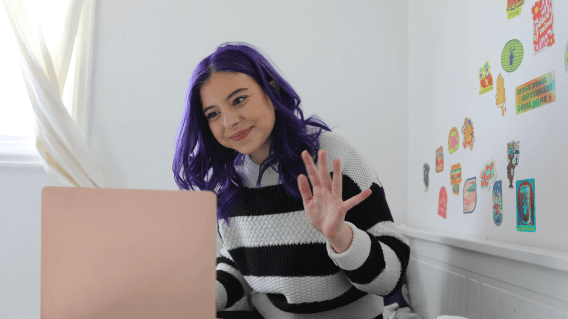
Schoolwork for Abi is a mix of scheduled, live classes called Class Connects, self-guided assignments, and career pathway-specific activities like labs at a mobile nursing unit.
A benefit of schools powered by K12 is that the educational materials—a computer, textbooks, supplies for offline activities, and more—are provided.
Learning Coaches typically spend between 1 to 3 hours each day with high school students, providing support.
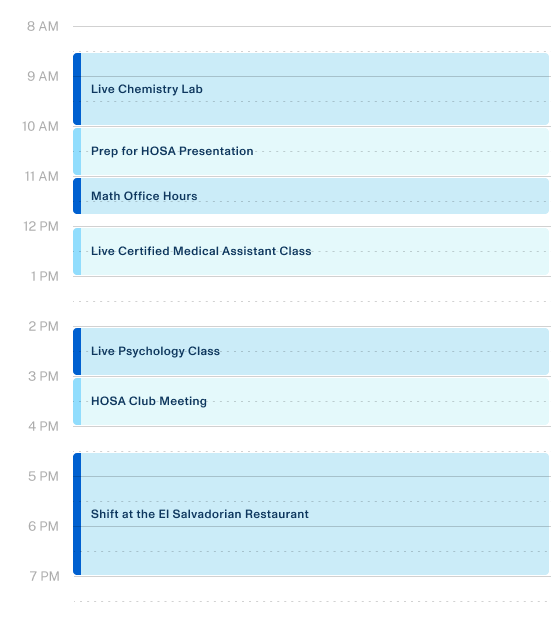
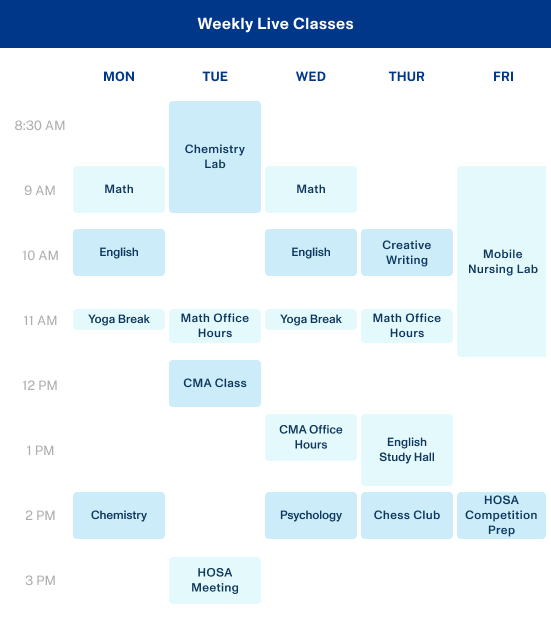
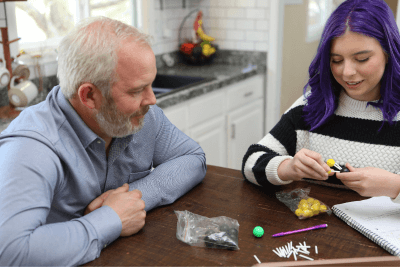
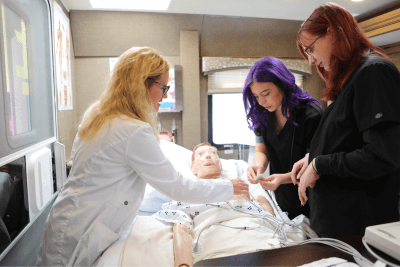


The number of classes students take varies per grade level and individual. For example, students in 11th grade, like Abi, typically take between 3–6 subjects each semester, with maybe 2–3 requiring scheduled, live classes.
In addition to core academic subjects, there’s a great selection of career-related electives, including the medical pathway courses Abi enjoys.
Abi, who wants to become a surgeon, takes classes like anatomy and physiology, medical terminology, and medical assisting.
By the time she graduates, Abi will have five certifications: CPR, Phlebotomy, EKG, Certified Medical Assistant, and Certified Nursing Assistant. These can help her get a job in a hospital and set her up with advanced knowledge for her college courses.
Online school is helping Abi build real-world skills for the future. She’s doing hands-on medical activities through the mobile nursing lab.
She’s building leadership and networking skills through a career club for future health professionals. All the while, she’s practicing time management and has the flexibility to work at the family restaurant, sharing El Salvadorian food and culture with the community.
Tim: I was blown away by the quality of the teachers. We had to learn the new platform, but there were lots of resources to help make sure we felt comfortable. We were very at ease.
Abi: Ms. Bossman is the teacher who runs the mobile nursing unit, and she has shared the realities of the industry so I can really know what to expect. Ms. Andrews also deserves a shout-out. She got me into HOSA and pushed me to take advantage of opportunities like my own research projects. Tim: The teachers excel in student engagement; it’s phenomenal. Abi gets direct, one-to-one time, and they’re available and eager to support her dreams of working in healthcare. In her medical classes, the instructors are professionals, too, so she can learn from people with real experience in the field.
Abi: I keep up with friends through things like dance and choir. My friends from online school and I hang out at HOSA activities, medical labs, and school meetups like when we do community service projects.
Abi: I was surprised by how much free time I actually had when school was organized into a schedule that worked for me. I’ve been able to join new clubs, take on leadership roles, hang out with friends, and work at the restaurant with Mom to interact with our community more. Tim: The amount of materials we received! We got the laptop, printer, and all the other school supplies Abi needed.
Tim: It was an instant match when we learned more about the curriculum and found out they offered specific career tracks where Abi could take her medical courses.
Abi: My biggest advice would be to look at all the possible benefits. All the things I’ve done in online school were things I never would have imagined a high school student could do. Honestly, I was a little scared at first, but now I have no regrets. Tim: I would say ask your kids what they really want to do to see if any of the career tracks match up to their interests. And ask all the questions. I had a million questions at the beginning, especially because I was stationed in Korea at the time, and was able to realize that the resources, class choices, and options to choose from are beyond what people might realize.
K12 has several tools available with Spanish translation, and interested and enrolled families can access K12.com, the Parent Portal, the K12 App, and customer support in Spanish.
Yes, the engaging curriculum is hands-on and includes materials for offline activities—all as part of the tuition-free education experience.
From kindergarten to high school, K12 provides tuition-free online education that empowers students to learn in ways that work for them. Browse options in your state to find the perfect fit for your family.
These are the stories of real students attending K12-powered schools and their families. Content is a combination of direct quotes and summaries from interviews. Their stories each reflect their experiences at their respective schools. Actual experiences can vary by student and school. These pages are designed to reflect a typical day in the life of a student attending an online K12-powered school. Individual class schedules and requirements will vary by state, school, and the individual needs of each student. Course materials vary, and certain schools may not provide computers or may have specific requirements for providing equipment.